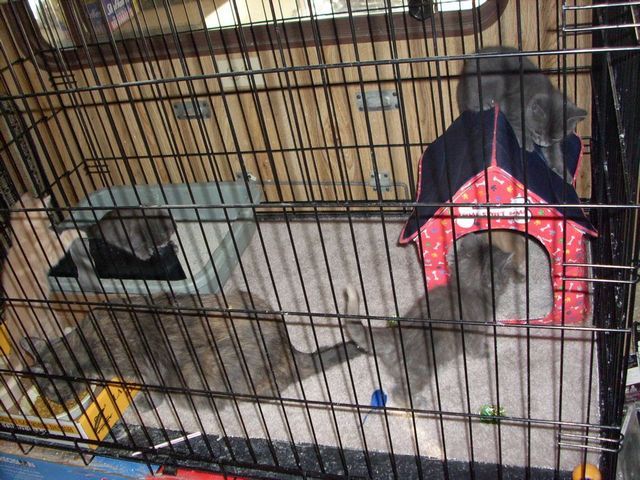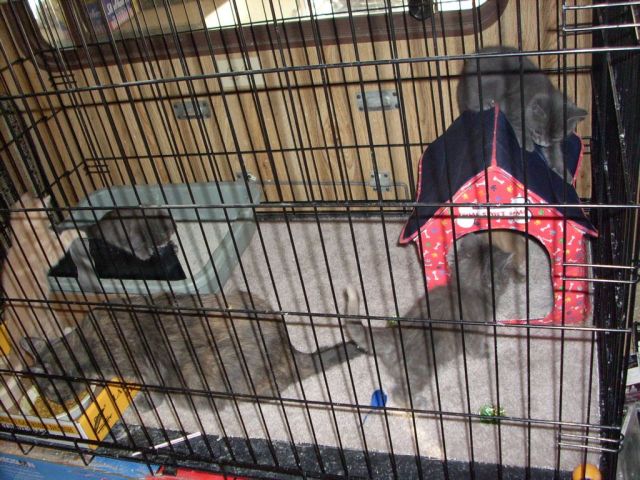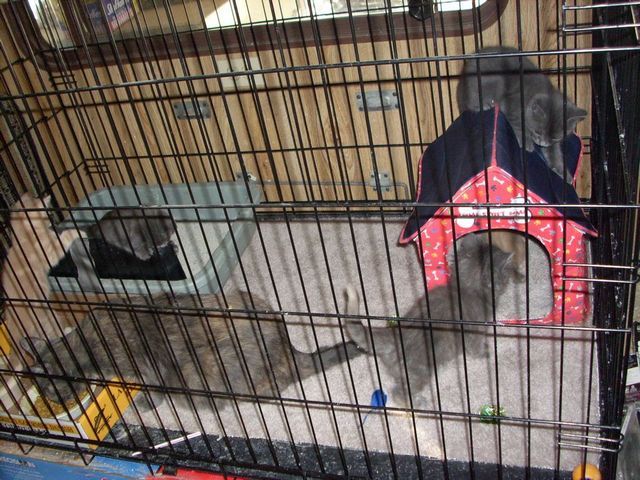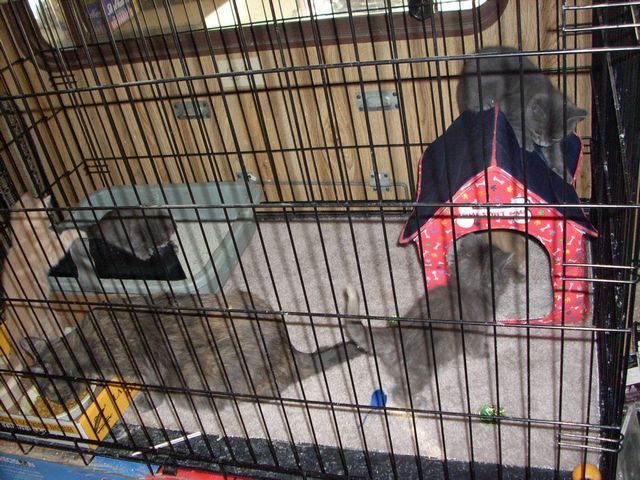QuestionIsobel was a feral kitten approximately twelve weeks old when taken from the colony and adopted by my husband and me. Now six, she is still not fully socialized...and probably never will be. I can hold her, but she is clearly not thrilled about it. I can take her onto my lap, but she will not stay. She will allow me to pet her forever...in fact, sometimes demands it!...but it's very rare to get a purr out of her. She has a rug at the turn of the stairs from which she can look out over the living room. It was there we were first able to handle her...touching her paws and tummy and stroking her. She seemed to feel safe on her rug. Now, when she is in need of attention, she comes to me, demands that I follow her to her rug, then rolls over for a tummy rub. At other times she is suspicious and anxious and will not let my husband or me near her. We are careful to avoid abrupt movements and loud noises that might startle her.
Our problem is that she has missed her last two annual vet checkups and is behind on her shots and worming. She seems to have a sixth sense when we "have plans" for her and can be impossible to catch. She cannot be enticed by treats and will fight fiercely to avoid being confined. At our last successful trip to the vet two years ago ("successful" only if you discount my husband's and my blood loss!), we gripped her by the scruff and wrapped a towel around her. The towel literally exploded when I relaxed my grip to wrap the towel more securely. We did get her into the carrier but just barely got the lid on in time. The next time we tried that technique she was completely unmanageable...all claws and teeth...and I was clawed from my eyebrows to my navel. (Well, almost.)
Our vet gave us a sedative (acepromazine), but the maximum dose she would allow (1/4 25mg tab) had no effect whatsoever on Isobel and actually seemed to make her worse. On one occasion I managed to close her in the bathroom where she sometimes follows me to see what I'm doing. (No privacy in this house!) The minute she realized the door was closed she began to caterwaul. I sat in there with her, talking to her, feeding her tuna, quietly reading my newspaper...and gradually she calmed down. After I left the bathroom to finish dressing, however, she must have gotten a claw between the pocket door and the jamb and managed to pull the heavy door open. Gone, baby, gone!
Knowing that each traumatic attempt is going to make the next one even harder, I do not try to chase her down. Our vet has solved this problem by assuring us that she will make time for Isobel any time we can get her to the clinic. Getting a collar on her or getting her into a carrier is another matter, however. After a go-around with either of these, we cannot get near her for days. A vet that makes house calls is not an option, as Isobel disappears the minute a strange car pulls into the drive. I'm guessing that attempts to catch and confine her when she was taken from the feral colony really did a number on her psyche. Do kitties suffer from Post Traumatic Stress Disorder?
Right now Isobel is relatively young and healthy. Although she is an indoor/outdoor kitty, there do not seem to be any other cats in the neighborhood from whom to catch something nasty. Both of our cats avoid the local wild life assiduously, but I am still concerned that her rabies shot has lapsed. As she ages she will eventually need a vet's care for illness or dental care. Any suggestions you might offer would be greatly appreciated. I can't think of anything else to try.
Priscilla Zink
AnswerHi Priscilla,
Thank you for being so kind and gentle to your kitty.
Yes, kitties do suffer from PTSD, just like all mammals.
I am not sure where you live? Is rabies even a concern? I would find out statistics of how many animals and cats actually have had it. and don't ask the vaccine company. Get real statistics...and decide what exactly is necessary. I would research titer results and Dr Jean Dodd's work if you are really interested in seeing what a vaccine schedule may look like and what it actually needed. Each animal is different, each locale is different, but the days of animals getting vaccines every year is long gone..
Over-vaccinating does more harm in the long run and doesn't always protect from the disease anyway.
Holistic vets don't believe in even broaching the topic for ten years after the first set of vaccines, so don't be overly concerned about taking her in for vaccines unless of course there is a severe endemic in your area and many cats have it.
Is it county required in your area? I know it is for dogs but not often for cats.
I am not a proponent of the "traditional vaccine schedule"
Annual vaccines are unnecessary in my holistic opinion..
If you cat is healthy and fed the proper food (no commercial cat food) and stress is kept to a minimum and she has a fulfilled life, generally her immune system will have no problem fighting off kitty colds etc. URI's are not generally serious with a healthy adult, and to be honest the vaccine is often not going to protect them. Esp the rhinotracheitis. I see cats vaccinated for it annually and constantly get colds which proves it is a virus (no cure for a virus) and that vaccine is useless.
Scruffing kitty is NEVER a good idea.. unless it is in a medical office and she is being restrained for blood etc..this will just teach kitty that being handled is painful..She is not 2 oz anymore so scruffing is not advisable...I can assure you the vet office is extremely traumatic for her..
I am not there with you to coach you but generally what i find is often the problem that exacerbates kitty's already anxious behavior is the owner's body language. If the owner is nervous, cannot master his./her own anxiety-kitty never will calm down. Forcing an anxious kitty to do anything works against us..
Great that you don't chase her.
You have to reverse the process in her mind-and re-train her associations... it is pretty difficult to explain this without being with you to show you. but you have to retrain her associations-with shorter positive intervals--
for ex..
if i am getting a kitty used to being held--i may have kitty in a great mood-know all of her happy spots she likes to be pet and then for a second or two calmly have my hands around her side--and let go gently while she is still happy... (brief seconds).
I may do this dozens of times over months DEPENDING ON THE CATS RESPONSE or move to the next step within a week
DEPENDING ON HOW THE INDIVIDUAL CAT IS RESPONDING.... then i may try to pick up a half inch off the floor for a brief second and put her down gently and immediately pet under chin or whatever her happy spots are..then build from there each time assessing her response..
it can be done..
.
It is a matter of training and mastery of one's own energy before knowing how to direct a cat's energy and knowing their body language well enough to know when to redirect and gently manipulate the energy..This is very difficult for some people and I can understand.
By the time kitty is old enough to need a vet, you may have a vet who does house calls in your area...
Best of luck in the slow desensitization process!! and it sounds like you are doing a great job so far!
If you need more help you can download my forms from my site. and for my intake fee i can be more succinct in helping. www.thenatureofthebeast.org
It is a bit difficult to explain in a paragraph but i hope this has offered you some suggestions you can use!!
Best,
Shanti

 Trying to blend families
QuestionQUESTION: Me and my 4 1/2 year old male cat rec
Trying to blend families
QuestionQUESTION: Me and my 4 1/2 year old male cat rec
 stray cat
Questioni have moved house and my cat has started to go
stray cat
Questioni have moved house and my cat has started to go
 Angry cat wants to go outside
QuestionHello, I adopted a cat from the humane society
Angry cat wants to go outside
QuestionHello, I adopted a cat from the humane society
 Neutred female with 6 moth non-neut male
QuestionOur female cat love our other white male, both
Neutred female with 6 moth non-neut male
QuestionOur female cat love our other white male, both
 Blending adult kitties
QuestionWe had 5 cats. 2 females, and 2 long haired mal
Blending adult kitties
QuestionWe had 5 cats. 2 females, and 2 long haired mal